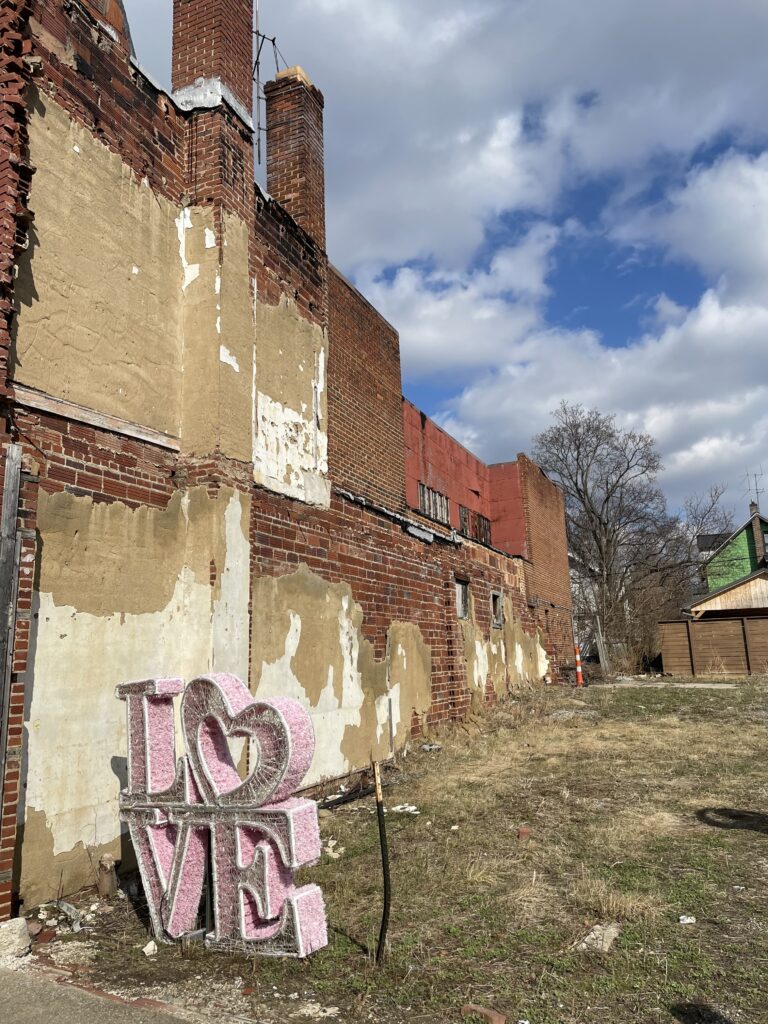By Helena Sepulveda
“When I moved here, I discovered that Akron was a refugee city, and I didn’t really know what that meant, ” said Pastor Cary Duckett, a California native who is the executive director of the International Welcome Center. The center is a faith-based organization that works to assist refugees in becoming acclimated to their life in the United States.

“So I began to research… and I discovered that in Akron there are thousands of refugees… and they are all on a path to citizenship.”
Pastor cary duckett
Love sign in North Hill International District. Photo by Grace Christopher.
The IWC helps provide low to moderate-income refugees with the resources they need to thrive in their new homes by empowering them within their communities. Along with supporting families, the center teaches them basic living skills while also offering legal services on a small scale to help them in their process to citizenship at an affordable cost. The organization currently operates through Grace Bible Church in Akron, though they are in the process of constructing an office space to better assist the number of refugees that come to them for support.

The center recently aided in obtaining citizenship for a Congolese refugee who needed heart surgery upon her arrival to the United States. She is a mother of six who was referred to the IWC after her first three months living in the United States, and she needed a job to be able to support her family. By helping her apply for citizenship and benefits, the International Welcome Center was able to help her find a job and get her and her family settled in their new community.
“For her to have that income coming in and for her to be able to provide for her family, that has been a huge relief.”
matt hicks, department of justice, international welcoming center
Hicks helps to assist refugees at the center in understanding the legal processes involved in obtaining documents.
When refugees first arrive in Akron they are directed to the International Institute of Akron, a government-funded organization that aids them in the initial resettlement process during the first 90 days of their time in the United States. After their first 90 days, many are referred to the International Welcome Center to help them adjust to their new life in Akron by teaching them simple skills like how to go grocery shopping and how to use a microwave.
Pastor Cary went to one family’s home to assist them with what they thought was a leak in their bathroom, only to find that the source of the issue was the pedestal bathtub that did not have a shower curtain. “So when they were taking a shower, water was going everywhere,” he said. “They didn’t know that they needed a shower curtain.”
The center also aids refugees in learning English. Volunteers often go to the refugees’ homes and have personal lessons with them in an environment where they can feel more comfortable.
Unlike the International Institute, the IWC does not receive government assistance and relies on donations and volunteers to keep the organization running smoothly and help as many refugees as possible. Although The IWC does not directly work with IIA, Cary said that the two often rely on each other for help when needed.
“A lot of the time we’re working with the same families,” he said.
When the center comes across a family with needs that they can’t meet, the center refers them to IIA to ensure those needs are met and vice versa. Word of mouth and referral from IIA are the main ways that many refugees are able to find the IWC and get the assistance they need to face the challenges of moving to the United States.
“The biggest challenges I think for them is the money portion and the fees associated with the government… but then it’s [also] dodging the people out there that are going to take advantage of them.
Matt hicks
He said that many refugees get taken advantage of during their transition to the U.S. because of the lack of information they receive about the legal process of becoming a citizen and the high costs that are often associated with the process.
The IWC provides legal resources at an income-based cost and The Department of Justice requires that services provided by the center are offered at a rate significantly lower than if refugees were to hire an attorney. These services include helping refugees with the citizenship process and educating them on legal documents. Through his work with the IWC, Hicks focuses on assisting refugees in filling for citizenship, obtaining travel documents or working for family reunification.
Although these services are a significant part of what is offered at the IWC, members greatly emphasize its role as a central support system for refugees that move to the area. Along with educating individuals on legal procedures and helping them in the steps to obtaining legal documents and certification, the center also aims to assist refugees by alleviating everyday tasks. Members of the IWC teach driving lessons, offer English and civic classes, and help refugees with grocery shopping and other day-to-day activities that may take longer for refugees to feel comfortable doing on their own.
“It’s a matter of helping these people realize that… we truly want to help them and that we’re not just here as a handout, but a hand up, we want to empower them and we’re on the right track with that.”
matt hicks
